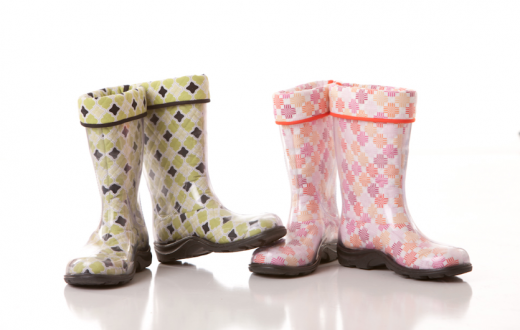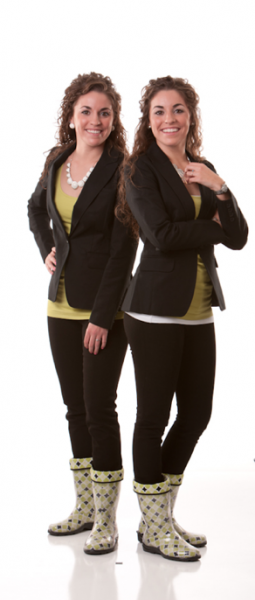Brand Building

For Brynne and Bailye Stansberry, business is in their blood. Now they’re betting their futures on an idea they’ve held since high school.
When Moberly residents Brynne and Bailye Stansberry were seniors in high school, their parents gave them a choice: a trip to Europe or a patent. After joining DECA, Distributive Education Clubs of America, as juniors, the pair created their own product to win one of the marketing club’s competitions.
“We started thinking about what we love and how to make it better,” Bailye says. “We hit on boots, but they aren’t warm, and they don’t show fun socks.”
So they took a chance and built a small prototype of their idea with sheet plastic and a demolished children’s boot. The two sewed liners with their grandmother, and soon they had something novel to share with the judges: clear boots with interchangeable liners.

The two took the boots to the competition and asked the judges for confidentiality. The judges agreed, the women presented, and they won, which qualified them for internationals. But prom fell on the same day. “We already had the dress, the limo…” Brynne says. “We thought, ‘We can’t not go [to prom].’”
After competing in DECA again the next year in a different category, Brynne and Bailye qualified for internationals. It again fell on prom. “Thinking back on it, it was probably a good thing — divine intervention — because if we went, our idea could have been taken,” Brynne says.
In the final months of senior year, the women were once again forced to choose between an American teen right of passage or their blossoming business. Europe or patent. They chose the patent, and started working towards building their company, Twoality.
Business in the blood
On the short side, patents take at least 18 months to be approved by the government, so in the meantime, Brynne and Bailye started at Columbia College, their brother’s alma mater, as ceramics majors.
The two have entrepreneurship in their blood, so an eventual switch to major in business wasn’t surprising. Their father, Doug Stansberry, co-owns Premier Paper and Packaging with his brother, Ed Stansberry, and their grandmother Mary Sue Stansberry owned a clothing store in Moberly, the Berry Box.
The twins have already found a place for themselves to stay in Columbia long-term with their budding business. “Premier [Paper and Packaging] warehouse will be divided for distribution purposes, so it’s part premier, part Twoality,” Bailye says.
While at Columbia College, the pair was asked to present to alumnus Steve Fishman, the CEO of Big Lots, who was taken aback by the women. That was Sept. 19, 2010. As a result, Columbia College gave each of the women $5,000 from the Steve and Barbara Fishman Entrepreneurial Fund to work on their idea. Brynne and Bailye took full advantage of their connection to Fishman, who would continue to be involved; he provided advice and even asked the twins’ advice on women’s shoe lines via text. In September 2012, Fishman donated $500,000 to the college to open the Fishman Center for Entrepreneurship.
Terry Smith, dean of academic affairs at Columbia College, says Brynne and Bailye were critical to Fishman’s gift. “He got a sense of what’s possible and thought, ‘It’s my alma mater, and I want to give back so more students will have opportunities like Brynne and Bailye,’” Smith says. And when the center is completed later this year, more students will.
“One thing we found is there are lots of people out here like Brynne and Bailye…that’s part of what we’re doing: creating a culture that seasons and fosters entrepreneurship,” says Sean Siebert, the pair’s longstanding mentor. For example, one of the other students the twins interact with is launching a smartphone application, and just by talking about their successes and shortcomings, the app developer was able to connect the pair with his roommate, who specializes in CAD, computer-aided design, and could help the women achieve their next goal.
 “You’re looking at different people at different points in their lives, but really entrepreneurs are cut from the same cloth, regardless of age,” Siebert says. Ever since Columbia College professor Sally Wells told the pair that Siebert was “the small-business man on campus” and Bailye emailed him out of the blue, Siebert has been their mentor.
“You’re looking at different people at different points in their lives, but really entrepreneurs are cut from the same cloth, regardless of age,” Siebert says. Ever since Columbia College professor Sally Wells told the pair that Siebert was “the small-business man on campus” and Bailye emailed him out of the blue, Siebert has been their mentor.
He, too, understands the spirit of entrepreneurship. In January of 2012, he decreased his role on Columbia College’s campus to open his own consulting company. Although he still plays an active role on the campus, he also is involved around town with Regional Economic Development Inc. But what really stoked his passion was growing up in his father’s bowling alley in Rolla, Mo.
“I joke about how I’m 36 years old, and I’ve already been paying into Social Security for 28 years,” he says, “because when I was 8, my dad gave me a job and put me on payroll.”
But regardless of age, the new Fishman Center for Entrepreneurship will make starting a business more approachable for everyone. “Fundamentally, we’re teaching people the core concepts to establish and run a successful business, whether you’re 22 or 42 or 62,” Siebert says.
Since Fishman’s gift to Columbia College, Siebert has been helping establish what the Center for Entrepreneurship will do and how it will do it. “The goal is to make this the type of curriculum we can market to college students everywhere as the most relevant entrepreneurship program,” Siebert says.
The eventual goal, Smith says, is to have a nationally known entrepreneurship program.
“MU has a lot of resources, and REDI is a great resource,” Siebert adds. “We’re not competing with anyone; we just want to complement what’s out there because we have a lot of talented students, too. We’re trying to collaborate as much as we can to make it about Columbia and not just Columbia College.”
Faith in an idea
A lot of the Brynne and Bailye’s success was catapulted forward by the REDI idea bounce they won in 2011. “That, we hope, made more people to think that although MU has many talented students, Columbia College does, too,” Siebert says about trying to create an association even in Columbia between entrepreneurship and CC.
“We applied for the competition but were rejected,” Brynne says. “We thought we should go anyway to make connections. In the morning, the keynote speaker asked the audience to stand up if anyone had an idea. Siebert turned to the twins and asked, “Are you feeling brave?” No, the pair chimed in unison. But they stood up anyway and asked for audience advice. They received nearly 30 business cards of people in the Columbia community willing to help them get to the next step.
When Brynne and Bailye returned from letting their dog out over lunch, they had been invited to participate in the competition. With an hour to prepare, the women ended up winning $1,000 of capital for Twoality.
Siebert is also active in the Chamber of Commerce in Columbia and introduced Brynne and Bailye to another mentor, Terry Culver, at the chamber. Now, the twins are looking forward to being mentors to other young entrepreneurs because they’ve already been through many of the difficult phases of starting a business.
Not only did they have to navigate patent law with an attorney all the way in California (via conference calls in their Moberly kitchen), but they also had to break down a brick wall with stubborn manufacturers.
“It was interesting to see people’s responses when we’d email them our idea,” Bailye says. “Some companies told us they don’t accept outside ideas, and others said [our idea] was impossible. So we started to realize we’d have to do a lot of this on our own as a small company.”
It took six months to get the first prototype made, and when Brynne tossed it back into the box, it cracked. “Well, that’s bad because girls throw their shoes around left and right,” Brynne says. So it was back to the drawing board. The next one was too small, the third prototype was three sizes too big, but eventually through trial and error, the twins had a physical copy of the idea they’d held onto since high school.
“So many people told them they couldn’t do it, even with this cool of an idea,” Siebert says. “Fifty people want to be the second person on board to help, but no one wants to be the first.”
“Yeah, where were they in the first level of prototyping because that was when it was hard,” Bailye adds. But one of the biggest moments in the pair’s business history was the decision to let go of the only big fish on the line, a major footwear group that wanted a license agreement. “When you do license agreements, you give them all the control, but your name is still on the product,” Brynne says. “So, basically, they could ruin our brand.” In the end, it came down to trust. So the pair closed that door and looked to the future.
Made in the U.S.A.
The boots, which will potentially retail for $59.99, and liners, $15.99, will be sold online at thetwoalitystore.com, starting this spring. The pair is considering selling on Amazon and QVC and remains open to the possibility of selling their product at small boutiques or department stores.
What they are sure of is the product will be almost completely made in the U.S.A. “The boots are made in California, and the liners are made in North America,” Bailye says. To reach their target market’s price point, the pair decided that the fabric will be cut and sewn in either Canada or Mexico. “The liners would be an estimated $50 if they were completely made in the U.S., and college girls like us couldn’t afford them anymore,” Brynne and Bailye say.
After they’ve explored their options with the adult female line, the pair has plans for a youth line, as well as to expand into other areas.
“Our big dream is to build our brand,” Bailye says. “We don’t want to be boot makers forever.” Part of that plan is a business model that will allow the pair to help others do what they are doing.
Jobs for the next generation
In trying to create a culture of entrepreneurship, Siebert has introduced the Brynne and Bailye to many students at Columbia College. “I didn’t want to intimidate other students with their idea or make them jealous,” he says. “I just say, ‘Hey, they’ve been through the process, so if you have an idea, we can make it real.’”
“People’s ideas aren’t always selling a million pairs of boots,” he continues. “Sometimes it’s just opening a muffler shop. We’ve got one student who’s trying to franchise his parent’s barbecue shop, and we’re being the two or three people who tell them, ‘Yes, you can do that.’”
Already, the women get emails from students and young entrepreneurs with good ideas. “We had one guy at Midway Arms ask us about patenting a hunting product, so we sent him in the right direction with our patent lawyer,” Brynne says. Although the pair make efforts to support other young entrepreneurs, they also say spending time with other people like them is helpful. “It’s nice to have them around, too, because they’re also the 21-year-old that isn’t going out on Friday and Saturday night.”
“I think it’s a big deal to focus on youth because so many kids go to a college town like Columbia for school and then go home to start business,” Brynne says. “So I think it’s really important to show them how their college community can support them in order to retain their talent.”
“In our generation, we’re the job creators because there just aren’t jobs,” Brynne and Bailye add. “Whether we happen to be the first ones to be very public about it or not, the lives we live now make it the only option. We had to create jobs for ourselves.”


